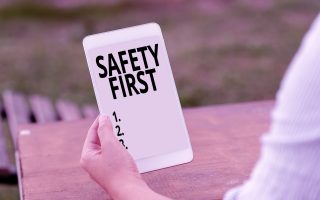
In our connected world, sharing is second nature. We post our morning coffee, our kids’ soccer games, and our vacation views. It feels harmless. It feels like connecting. Unfortunately, we are often sharing far more information than we realize.
To a normal person, your post is just a snapshot of your day. To a stalker, a thief, or a scammer, however, it is a piece of a puzzle. In fact, these “innocent” things you post online can provide a detailed roadmap to your life. They can compromise your safety and the safety of your family. Therefore, it is time to get smarter about what we share.
1. Real-Time Geotagging and “Checking In”
This is the most dangerous habit. When you “check in” at a restaurant, you are announcing to the world, “I am at this specific location right now.” More importantly, you are announcing, “My home is empty.”
Obviously, this is a goldmine for burglars. A stalker also learns your habits. For example, they know where you eat, where you work out, and where you shop. For this reason, always post your photos *after* you have left a location, not while you are there.
2. Your Child’s School Uniform or Logo
You are so proud of your child’s first day of school. So, you snap a picture. In the photo, their school’s name is clearly visible on their shirt or the sign in the background. This is terrifyingly dangerous.
The reason is, you have just told strangers exactly where your child spends their day. A predator could then use this information to build trust (“Your mom sent me to pick you up from [School Name]”). You must blur all school logos and avoid naming schools publicly.
3. Photos of Your Keys or New Driver’s License
You post a “Finally passed!” picture with your new driver’s license. Or, you share a “New homeowner!” shot with your new house keys. These are huge mistakes. Your license contains your full address, date of birth, and signature.
Even worse, people can use high-resolution photos of keys to create copies. A criminal can duplicate your key from a single picture. Keep all forms of identification and keys offline.
4. Your Workout Maps
Apps like Strava and MapMyRun are great for tracking progress. However, sharing your routes publicly is a stalker’s dream. In effect, you are literally providing a map of where you will be, alone, often at a predictable time.
Furthermore, if your route starts and ends at your home, you have also just broadcasted your home address. You should set these apps to private. Do not share your run or bike routes with the public.
5. “Just Bought a House!” Photos (With Address)
That photo of you holding the “Sold” sign in front of your new home is a classic. But what is in the background? Is the street sign visible? Is your new house number? Scammers and stalkers can easily find your new address. Combine this with real-time vacation posts, and you have a problem.
6. Pictures of Your New Car (With License Plate)
You are excited about your new ride. You post a full shot, and the license plate is clearly visible. This is one of the easiest things you post online to overlook. A criminal can use a license plate to track your vehicle’s location. In some states, they can even use it to find your personal information.
7. Your Full Birthdate
Your friends want to wish you a happy birthday. You have your full birthdate (month, day, and year) public on your profile. This is a critical piece of information for identity thieves. Your date of birth, combined with your name, is a key to unlocking your bank accounts and credit.
8. “Ask Me Anything” Quizzes
These seem like harmless fun. They ask for your first pet’s name, your mother’s maiden name, or the street you grew up on. Do these questions sound familiar? They are the most common security questions used to protect your accounts. In short, you are literally handing over the keys to your digital life.
9. Boarding Passes and Travel Plans
Posting a photo of your boarding pass is like screaming “I’m not home!” Additionally, the barcode on your pass contains a huge amount of personal data. Scammers can use it to get your frequent flyer information, your full name, and even details about your passport. Similarly, posting your detailed itinerary tells criminals exactly how long your house will be empty.
10. Complaining About Your Boss or Job
Venting about a terrible day at work feels good. But it is incredibly public. This identifies your employer. It gives away your work schedule. Moreover, it gives a stalker another location where you can be reliably found. It can also, very easily, get you fired.
11. Your “View from My Desk” Shot
This is another subtle way you give away your location. That “view” can be reverse analyzed by a stalker. They can use the surrounding buildings and landmarks to pinpoint exactly which building, and even which floor, you work on. It’s a seemingly innocent photo that reveals too much.
Privacy Is Power
This is not about being paranoid. It is about being smart. The digital world has different rules. Your privacy is a form of security. Before you hit ‘post,’ take five seconds. Ask yourself: “What information am I *really* sharing?”
Look for street signs. Check for logos. Blur license plates. Stop tagging your real-time location. You can, and should, share your life with friends and family. Just be mindful of the silent audience that is also watching. A little digital caution is one of the most important Cautions you can take.
What’s one online habit you’re going to change after reading this? Let’s talk about digital safety in the comments.
What to Read Next…
- Is Your New Love a Criminal? 5 Telltale Signs Your Online Romance Is a Con
- 6 Household Items Criminals Use To Spy on Victims
- 10 Relationship Habits That Slowly Break Trust
- Dating at 60 Is Terrifying: 9 Brutal Truths About Online Dating After 50
- 6 Online Dating Habits That Lower Female Safety

Latrice is a dedicated professional with a rich background in social work, complemented by an Associate Degree in the field. Her journey has been uniquely shaped by the rewarding experience of being a stay-at-home mom to her two children, aged 13 and 5. This role has not only been a testament to her commitment to family but has also provided her with invaluable life lessons and insights.
As a mother, Latrice has embraced the opportunity to educate her children on essential life skills, with a special focus on financial literacy, the nuances of life, and the importance of inner peace.







